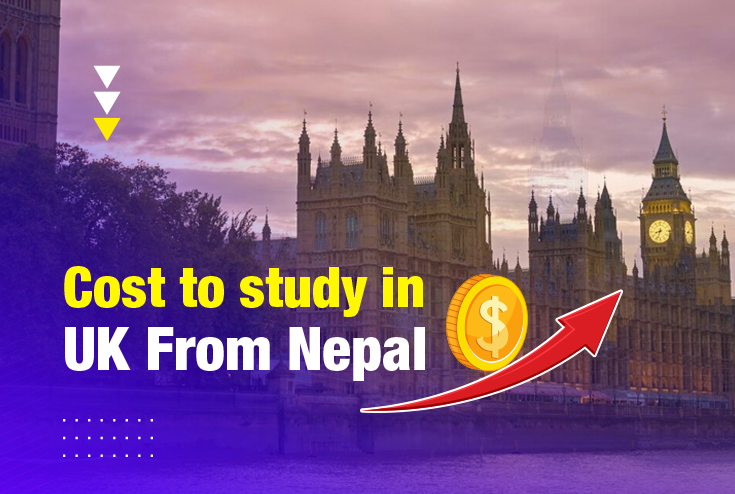
Cost to Study in UK from Nepal: A Guide 2025
The total cost to study in the UK from Nepal ranges from £22,000 to £40,000 per year. This includes tuition fees of £10,000-£25,000 for undergraduate courses or £12,000-£40,000 for postgraduate courses, plus living expenses of £12,000-£15,000 annually. Students must also budget for visa fees (£490) and healthcare surcharge (£776 per year).
Table of Contents
Cost to Study in UK from Nepal
Total Cost Overview
Why Choose the UK for Higher Education?
Advantages for Nepali Students
Basic Requirements for UK Study
Academic Requirements
Undergraduate Programs
Postgraduate Programs
English Language Requirements
IELTS and Other Accepted Tests
Documentation Requirements
Academic Documents
Financial Documents
Personal Documents
Comprehensive Cost Breakdown
Academic Costs
Undergraduate Course Costs by Field
Postgraduate Course Costs
Living Expenses Breakdown
Accommodation Options and Costs
Monthly Living Costs
Study Materials
Transportation
Insurance
Visa Requirements and Process
Financial Requirements for Student Visa
Visa Costs
Visa Application Process
CAS Requirements
Documentation Checklist
Visa Success Rates and Tips
Success Rate Factors
Common Rejection Reasons
Scholarship and Funding Opportunities
Major Scholarship Programs
University-Specific Scholarships
Part-Time Work Opportunities
Work Limits and Regulations
Popular Student Jobs
Career Prospects and PR Opportunities
Post-Study Work Options
Graduate Route Visa
Skilled Worker Visa
Path to Permanent Residence (PR)
Timeline to PR
Settlement Requirements
Practical Tips for Cost Management
Pre-Departure Savings
Cost-Cutting Strategies
Conclusion
- FAQs
Why Choose the UK for Higher Education?
The United Kingdom stands as one of the most prestigious educational destinations globally, attracting thousands of Nepali students each year. This comprehensive guide will walk you through every aspect of studying in the UK, from costs and requirements to practical living advice and career opportunities.
The UK's education system offers several unique advantages for Nepali students:
Shorter program duration (3 years for undergraduate, 1 year for master's)
Globally recognized qualifications
Diverse cultural exposure
Extensive research opportunities
Post-study work opportunities
Strong Nepali student community
Basic Requirements for UK Study
Academic Requirements
For Undergraduate Programs
Completion of Grade 12/Higher Secondary Education
Minimum 60% in relevant subjects
Mathematics requirement for specific courses (Engineering, Sciences)
Portfolio requirements for creative courses
Personal statement
Academic references
For Postgraduate Programs
Bachelor's degree with minimum 2:2 honors (approximately 60-65%)
Relevant work experience (for certain courses)
Research proposal (for research degrees)
Portfolio (for creative courses)
Academic/professional references
English Language Requirements
IELTS Requirements
Undergraduate: Overall 6.0-6.5 (no band less than 5.5)
Postgraduate: Overall 6.5-7.0 (no band less than 6.0)
Some universities accept:
PTE Academic
TOEFL iBT
Duolingo English Test (check university acceptance)
Documentation Requirements
Essential Documents
Academic Documents
All academic transcripts and certificates
Certified translations if not in English
Statement of comparability from UK ENIC
Financial Documents
Bank statements (6 months)
Sponsor documents (if applicable)
Scholarship award letters
Property valuations (if using as financial evidence)
Personal Documents
Valid passport
Updated CV/Resume
Birth certificate
Passport-sized photographs
Personal statement
Portfolio (if required)
Comprehensive Cost Breakdown
Academic Costs
Undergraduate Course Costs by Field
Arts and Humanities
Regular universities: £15,000 - £20,000
Russell Group universities: £18,000 - £25,000
Specialized programs: £20,000 - £28,000
Science and Engineering
Laboratory-based programs: £20,000 - £30,000
Computer Science: £18,000 - £26,000
Engineering specializations: £22,000 - £32,000
Medical and Clinical Courses
Medicine: £30,000 - £45,000
Dentistry: £28,000 - £40,000
Nursing: £17,000 - £25,000
Business and Management
General Business: £17,000 - £25,000
Specialized MBA: £25,000 - £45,000
Finance courses: £20,000 - £30,000
Postgraduate Course Costs
Taught Masters (MSc/MA)
Business/Management: £20,000 - £35,000
Engineering: £18,000 - £25,000
Arts/Humanities: £16,000 - £22,000
Science: £18,000 - £28,000
Research Degrees (MPhil/PhD)
Arts/Humanities: £15,000 - £20,000 per year
Science/Engineering: £20,000 - £30,000 per year
Living Expenses Detailed Breakdown
Accommodation Options and Costs
University Halls
London: £700 - £1,200 monthly
Other cities: £500 - £800 monthly
Catered options: Additional £100 - £200 monthly
En-suite rooms: Additional £50 - £150 monthly
Private Accommodation
Shared houses: £400 - £800 monthly
Studio apartments: £800 - £1,500 monthly
Bills included options: Additional £50 - £100
Security deposits: 1-2 months' rent
Monthly Living Costs
Food and Groceries
Basic groceries: £200 - £300
Eating out: £100 - £200
Special dietary requirements: Additional £50 - £100
Utilities
Electricity/Gas: £80 - £120
Water: £20 - £30
Internet: £20 - £30
Mobile phone: £15 - £25
TV License: £13.25 monthly
Study Materials
Textbooks: £200 - £400 per year
Stationery: £50 - £100 per year
Laptop/Computer: £400 - £800 (one-time)
Printing costs: £50 - £100 per year
Transportation
Student Oyster Card (London): £100 - £150 monthly
Local bus passes: £50 - £80 monthly
Train travel: Various savings with 16-25 Railcard
Bicycle costs: £100 - £200 (one-time purchase)
Insurance
Health surcharge: £776 per year
Contents insurance: £50 - £100 per year
Travel insurance: £100 - £200 per year
Visa Requirements and Process
Financial Requirements for Student Visa
Maintenance Funds
London studies: £1,483 per month (£13,347 for 9 months)
Outside London: £1,136 per month (£10,224 for 9 months)
Funds must be held for 28 consecutive days
Additional funds for dependents
Visa Costs
Application fee: £524 per person
Health surcharge: £776 per year (£2,328 for 3 years)
Priority service (optional): £500
Super priority service (optional): £800
Visa Application Process
CAS Requirements
Unconditional offer acceptance
Deposit payment (if required)
Document verification
TB test (if applicable)
Documentation Checklist
Valid passport
CAS letter
Financial documents
English language certificates
Academic qualifications
TB test certificate
Police registration (if required)
Current Visa Success Rates and Tips
Success Rate Factors
Clear documentation: 25% impact
Genuine student interview: 30% impact
Financial evidence: 25% impact
Academic background: 20% impact
Common Rejection Reasons
Insufficient funds
Unclear source of funds
Incomplete documentation
Poor interview performance
Credibility issues
Scholarship and Funding Opportunities
Major Scholarship Programs
Commonwealth Scholarships
Full funding available
Living allowance included
Application deadline: November
Success rate: Highly competitive (2-5%)
Chevening Scholarships
Covers tuition, living costs, and flights
Leadership potential requirement
Application period: September-November
Success rate: 5-10%
University-Specific Scholarships
Merit-based awards
Sports scholarships
Early bird discounts
Alumni discounts
Department-specific funding
Part-Time Work Opportunities
During Studies
Maximum 20 hours per week during term
Full-time during holidays
Minimum wage: £10.42 per hour
Popular student jobs:
Retail: £8-£12 per hour
Hospitality: £9-£15 per hour
University jobs: £10-£15 per hour
Tutoring: £15-£25 per hour
Career Prospects and PR Opportunities
Post-Study Work Options
Graduate Route Visa
1.5 years (18 months) for undergraduates or masters
3 years for PhD
No sponsor requirement
Flexible work options
Skilled Worker Visa
Requires employer sponsorship
Minimum salary: £38,700 (general) or £30,960 for new graduates and PhD holders.
Leading to settlement
Specific skill requirements
Path to Permanent Residence
Timeline to PR
10 years continuous residence
Eligible work visa status
English language requirement
Life in the UK test
No excessive absences
Settlement Requirements
Income threshold
Character requirements
Continuous residence
Application fees
Practical Tips for Cost Management
Pre-Departure Savings
Start saving 1-2 years in advance
Consider fixed deposits
Explore education loans
Research scholarship deadlines
Cost-Cutting Strategies
Early accommodation booking
Student discount cards
Meal preparation
Second-hand textbooks
Student bank accounts
Conclusion
Studying in the UK represents a significant investment in your future, with total annual costs ranging from £25,000 to £45,000. While the initial expenses may seem daunting, the combination of world-class education, post-study work opportunities, and potential career growth makes it a valuable investment for Nepali students. Careful planning, early preparation, and exploring all funding options can make this dream more achievable.
Frequently Asked Question- Cost to Study in UK from Nepal
1: Can I study in the UK with 10 lakhs NPR?
A: No, 10 lakhs NPR alone is insufficient. You'll need approximately 50-60 lakhs NPR for one year, covering tuition (30-40 lakhs) and living expenses (20-25 lakhs). Consider education loans, scholarships, and family support for funding.
2: What is the exact bank balance required for a UK student visa from Nepal?
A: For London: Tuition fees + £13,347 (living costs for 9 months) For outside London: Tuition fees + £10,224 (living costs for 9 months) Funds must be maintained for 28 consecutive days in your or your sponsor's account.
3: How do I prove my financial capability for the UK student visa? A: You can prove through:
Personal/parent's bank statements (6 months)
Fixed deposits
Education loans
Scholarship letters
Property valuations (with proper documentation)
Combination of above sources
4: What are the job prospects for Nepali students after graduation?
A: With the Graduate Route visa, you can:
Work in any sector
Start your own business
Gain valuable UK work experience
Apply for Skilled Worker visa
Average starting salaries: £25,000-£35,000 annually
5: How can I minimize my study costs in the UK?
A: Cost-saving strategies include:
Choosing universities outside London
Applying for scholarships early
Sharing accommodation
Using student discounts
Working part-time
Cooking meals at home
Using student travel cards
Also Read:
Best Consultancy in Nepal for UK
Study in UK from Nepal: A Guide 2025




